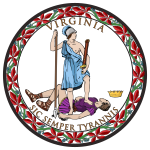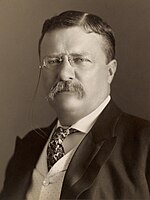| ||||||||||||||||||||||||||
| ||||||||||||||||||||||||||
 County Results
| ||||||||||||||||||||||||||
| ||||||||||||||||||||||||||
| Elections in Virginia |
|---|
 |
The 1904 United States presidential election in Virginia took place on November 8, 1904, as part of the 1904 United States presidential election. Voters chose 12 representatives, or electors to the Electoral College, who voted for president and vice president.
Following the state’s delayed readmission to the Union, Virginia was unique among ex-Confederate states in not having a period of Republican control during Reconstruction, due to the failure of the Underwood Constitution to pass in 1868[1] and the consequent support for the Conservative Party that fused prewar Democrats and Whigs in the first postwar elections and consistently controlled the state legislature after readmission. From 1879, however, a fusion with the “Readjuster” faction of the state Democratic Party would revitalize the Republicans[1] until 1883, although the state GOP would remain competitive in statewide elections — only narrowly failing to carry the state in 1888[1] — until the Cleveland Administration eliminated federal oversight while the Walton Act created the secret ballot and began large-scale black disenfranchisement.[2]
However, despite its dominant position, the Democratic Party was deeply divided between the conservative Gold Democrats of a state whose economy was already substantially influenced by the rapidly industrializing Northeast, and a Populist-influenced faction centered in the state’s rural areas.[2] Northern and Southwest Virginia were supportive of the Republican policies of the gold standard and high tariffs,[2] and trended towards William McKinley in 1896 and 1900 — ultimately becoming the mainstay of a “lily-white” Jim Crow state Republican Party for the ensuing half-century, allowing the party to remain more viable than in any other ex-Confederate state except North Carolina and Tennessee where extremely loyal Unionist Republicanism remained.[3]
Following the 1900 election, a new constitution was drafted with a cumulative poll tax and literacy tests that served to reduce voter turnout dramatically.[4] The new constitution was supposedly a response to persistent electoral fraud, common in the Black Belt as it was in other Southern states.[5] After much debate over how rigidly to disenfranchise black voters, alongside the question of whether poor whites should be disenfranchised,[4] the ultimately produced Constitution featured some of the most stringent poll tax and literacy requirements in the former Confederacy. These stringent suffrage requirements would mean Virginia’s 1900 turnout would not be equaled until 1952, by which time the state’s population had almost doubled.[a]
From the earliest polls, it was clear that Democratic candidate, Chief Judge of the New York Court of Appeals Alton B. Parker was always going to carry Virginia.[6] Neither candidate campaigned in the state during the fall. Virginia ultimately voted for Parker over the Republican candidate, incumbent President Theodore Roosevelt. Parker won the state by a margin of 24.90 percentage points.
- ^ a b c Heersink, Boris; Jenkins, Jeffrey A. Republican Party Politics and the American South, 1865–1968. pp. 217–221. ISBN 1107158435.
- ^ a b c Moger, Allen. "The Rift in Virginia Democracy in 1896". The Journal of Southern History. 4 (3): 295–317.
- ^ Phillips, Kevin P.; The Emerging Republican Majority, pp. 210, 242 ISBN 978-0-691-16324-6
- ^ a b Kousser, J. Morgan. The Shaping of Southern Politics Suffrage Restriction and the Establishment of the One-Party South, 1880-1910. Yale University Press. pp. 178–181. ISBN 0-300-01696-4.
- ^ Perman, Michael (2001). Struggle for Mastery: Disfranchisement in the South, 1888-1908. pp. 195–196. ISBN 080784909X.
- ^ "A Conservative Estimate". Democrat and Chronicle. Rochester, New York. July 20, 1904. p. 6.
Cite error: There are <ref group=lower-alpha> tags or {{efn}} templates on this page, but the references will not show without a {{reflist|group=lower-alpha}} template or {{notelist}} template (see the help page).
© MMXXIII Rich X Search. We shall prevail. All rights reserved. Rich X Search


